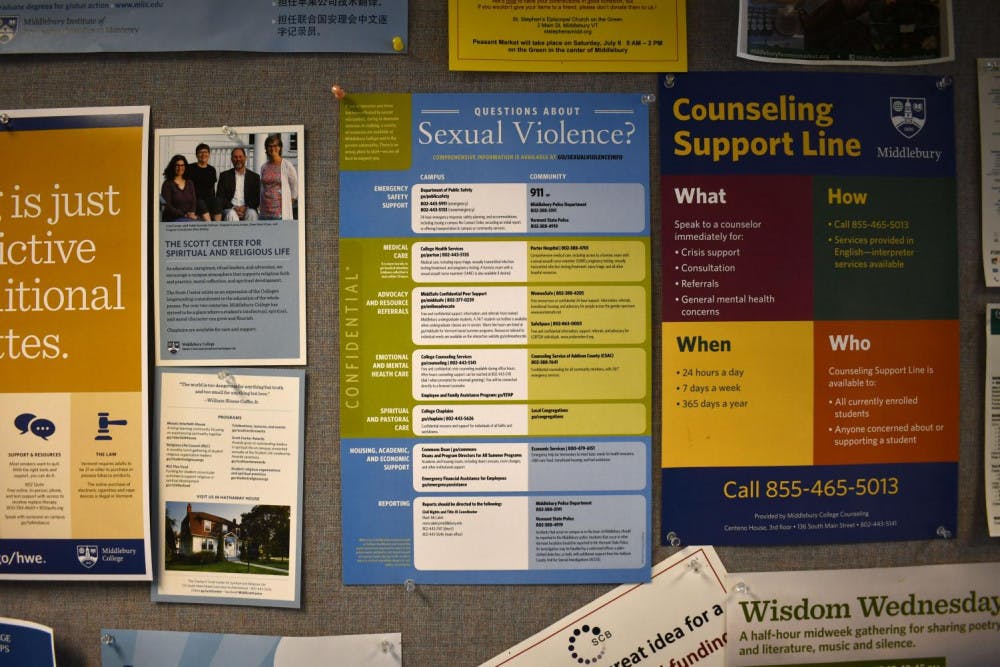After Secretary of Education Betsy DeVos announced new Title IX regulations on May 6, Middlebury implemented changes to its policies on Aug. 14 in accordance with the new guidelines. Students and advocates across the country fear that Devos’ changes could introduce new obstacles in the process of reporting sexual assault, bolstering the defense of those accused.
The more than 2,000 pages of regulations released last spring address Title IX, a 1972 federal civil rights law which prohibits discrimination based on sex in relation to any education program or activity that receives federal funding. The law covers a wide range of issues, from equality of opportunities in athletics to how schools address incidents of sexual harassment and assault.
The changes released in May alter the definitions of sex discrimination and harassment, changing how schools are required to respond to reports and which complaints the school is required to adjudicate under federal law.
The U.S. Department of Education published a press release on May 6 announcing the changes. It reads, “U.S. Secretary of Education Betsy DeVos took historic action today to strengthen Title IX protections for survivors of sexual misconduct and to restore due process in campus proceedings to ensure all students can pursue an education free from sex discrimination.”.
The most fervently contested changes to Title IX involve the investigation procedures for reports of sexual harassment.
A Brookings Institute analysis of the new regulations found that DeVos’s definition of sexual harassment demonstrates a narrowed understanding of the term from Obama-era standards. But it still remains broader than the even narrower definition offered by the Supreme Court.
President and CEO of the National Women’s Law Center Fatima Goss Graves responded to the new regulations with a commitment to taking legal action against the Department of Education.
“If this rule goes into effect, survivors will be denied their civil rights and will get the message loud and clear that there is no point in reporting assault,” she wrote in a May 6 statement. “We refuse to go back to the days when rape and harassment in schools were ignored and swept under the rug.”
Implementing Title IX modifications at Middlebury

The newly labeled Civil Rights and Title IX Office at Middlebury was tasked with implementing these new changes over the summer. Marti McCaleb serves as the college’s Civil Rights and Title IX Coordinator.
“The Department of Education has, for the first time in almost 50 years, issued binding legal rules governing how colleges respond to complaints of sexual harassment,” McCaleb said.
Some of the new regulations provide detailed requirements for colleges to follow, but others grant schools broad discretion in deciding what standards and practices to implement and how to go about writing their policies.
“Middlebury has not changed any of its behavioral expectations for students or employees,” McCaleb said. “We have restructured our policies and created a new investigation and resolution procedure for cases that fall under the new Title IX rules. For matters that don’t meet the federal definition, we will still respond to reports of misconduct using processes similar to those we have used in the past.”
The Middlebury College handbook Non-Discrimination Policy defines sexual harassment to include quid pro quo sexual harassment, meaning “unwelcome sexual advances, requests for sexual favors, and other verbal, written, visual or physical conduct of a sexual nature,” when compliance with such requests is explicitly or implicitly seen as impacting one’s employment or education. It also prohibits other discriminatory harassment based on or motivated by an individual’s actual or perceived sex, sexual orientation, or gender identity or expression in the same way that discriminatory harassment based on race or other protected characteristics is prohibited. Sexual assault is considered a form of sexual harassment.
All college employees who are not specifically designated as Confidential Resources are required to report suspected instances of sexual harassment. Confidential Resources include — but are not limited to — MiddSafe, college counseling and medical providers and college chaplains.
The largest change being made to bring Middlebury into compliance with the new federal guidelines is the implementation of live hearings and the informal resolution option, according to McCaleb. For conduct covered under the new regulations, there is a distinction between a “report” and a “formal complaint.” The former can be addressed with various non-punitive supportive measures, while the latter must meet the newly narrowed definition of sexual harassment and triggers a college investigation unless the parties both agree to pursue informal resolution.
“Live hearings will be provided as required by the 2020 Title IX regulations,” reads the Middlebury handbook section on TIX Investigation & Resolutions Procedure. “At the request of either party, Middlebury will provide for the hearing to occur with the parties located in separate rooms with technology enabling the hearing officer and parties to simultaneously see and hear the party or the witness answering questions.” This section of the handbook details the process for reporting sexual harassment, undertaking an investigation, carrying out a hearing and sanctioning.
During the hearing, each party must have an “advisor” who may or may not be an attorney. If either party does not have an advisor, the school will assign them one. Advisors will “conduct direct, oral, real-time cross-examination of witnesses,” according to McCaleb.
Hearings will be supervised by a neutral decision-maker, an individual other than the Title IX Coordinator. This individual is tasked with making evidentiary rulings and determinations during the hearing. Following the hearing, they will release a written decision detailing facts of the case as determined through the hearing and conclusions in relation to the school’s Title IX policy.
Eric López, a human relations officer, will serve as a hearing officer under the new Title IX system.
“We will be responsible for conducting the hearings, making determinations regarding the relevance of questions at those hearings, and ensuring that only evidence that can be considered pursuant to the new regulations is used in determining whether a respondent can be found responsible for violations covered by the Title IX procedure,” López said of his responsibilities.
These new procedures contrast with Middlebury’s previous policy, which did not allow for any contact between the two parties and instead relied on an investigator and decision-maker to examine the available facts and make a decision. Each party could meet with them separately upon request.
Another significant change is the allowance of informal resolutions. Under the Obama administration, the Department of Education released a 2011 Dear Colleague Letter which required all complaints to be investigated in a formal hearing. Yet under the new changes to Title IX, students who make an informal report can opt to partake in a voluntary “adaptive resolution.”
“This structured approach, grounded in the principles of restorative justice, is designed to be adaptable so that a process can be identified that is appropriate for the harm caused and to best meet the needs of the individuals involved,” said Middlebury Director of Education for Equity and Inclusion Renee Wells. Wells emphasized that adaptable resolution facilitators work to ensure the process does not cause additional harm to survivors.
Adaptable resolution processes are all overseen by individuals trained in restorative justice, bias, historical harm and the current Title IX regulations. According to Wells, resolutions could include direct processes — interactions which include those individuals who have been harmed and those who have perpetrated the harm — and indirect processes, or separate meetings that do not require any in-person interactions between the individuals involved. Individuals work directly with facilitators to determine which processes they want to pursue.
Wells sees potential benefits in the fact that all of these processes provide students with greater agency and are crafted to the individual needs of those involved. She acknowledged that the considerable length involved in completing the course of an adaptable resolution could deter some students from participating.
“This creates a different pathway for processing harm and can be used in a variety of situations that could ultimately create significant culture change around how we view harming others and what it takes to acknowledge that and move forward,” wrote Assistant Director of Health and Wellness Education Emily Wagner in an email to The Campus. Wagner, a violence prevention education specialist, played a part in determining how to implement the new changes at Middlebury.
Leah Salzman ’21.5 worked as an intern for the Civil Rights and Title IX office this past summer, helping to determine how to implement the changes to Title IX. “I believe the work we did to implement the new regulations allowed for us to focus on making changes that clarify information and actually enhance connection with the student body,” she said.
Salzman thinks that it is important for students to know that filing a report can allow them to access resources and support measures, even if they ultimately decide not to file a formal complaint and go through the investigation procedures.
“Our commitment to education equity and equal access has not changed in light of these new regulations,” McCaleb and Chief Diversity Officer Miguel Fernández wrote in an Aug. 18 email to the student body.
Changes will have varied impacts on students across the country
Each individual school has some discretion to determine how they will implement certain policies. The new regulations “leave much room for colleges to work with their own communities to maintain and strengthen their protections for student safety, and to assure a fair, impartial resolution to complaints,” McCaleb said. Consequently, the impact of Title IX on students will differ depending on the institution.
There is also an increased emphasis on providing support, such as counseling, academic and residential accommodations, to students who experience sexual harassment. According to McCaleb, these measures reflect Middlebury’s pre-existing practices but could lead to significant changes at other institutions.
“The live hearing model for investigations (required by federal Title IX policy, so Middlebury doesn’t have a choice about this) is generally considered to not be survivor-friendly and could be a deterrent to students reporting violations,” Wagner wrote. McCaleb hopes that the option for students to file an informal report will help prevent the new live hearing requirement from deterring reporting.
McCaleb predicts that changes to mandatory reporting, standards of evidence, supportive practices and investigative processes will have the greatest impact on students at colleges and universities around the United States.
Under the Obama administration, schools generally required most college employees to serve as mandatory reporters of sexual misconduct or harassment. However, the new guidelines relax this standard, and schools can decide whether or not all employees serve as mandatory reporters. McCaleb sees two perspectives on this change: it could reduce colleges’ accountability for reporting and addressing misconduct, or it could allow students more autonomy and control over when and how they choose to come forward with complaints.
“These changes could have a chilling effect on reporting, or it could help reinforce the relationship of trust and privacy that students have with faculty or other college administrators and provide a greater sense of autonomy and fairness over the Title IX complaint and investigation process,” McCaleb said.
Instances of sexual harassment and assault at Middlebury can now be reported through an online reporting form at go/report.
Corrections: This article was updated with more accurate definitions and terminology.
Changes to Title IX alter reporting and investigation procedures

Middlebury’s Civil Rights and Title IX Office is located in the Service Building, the office is tasked with monitoring the college’s compliance with Title IX regulations. (Max Padilla)
Comments



